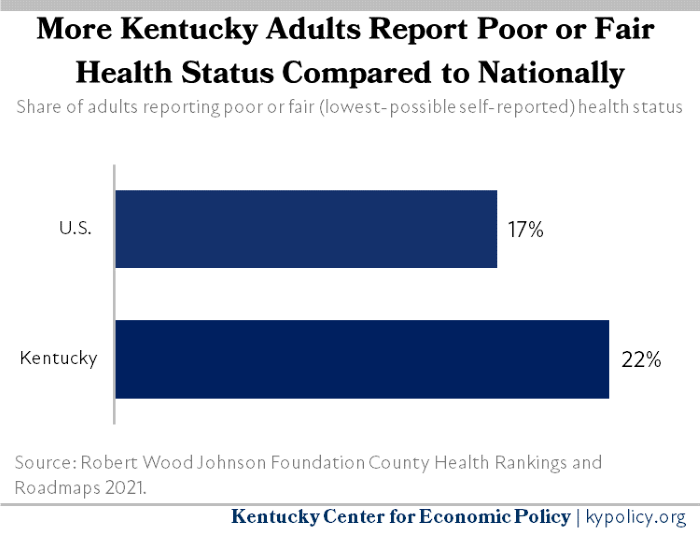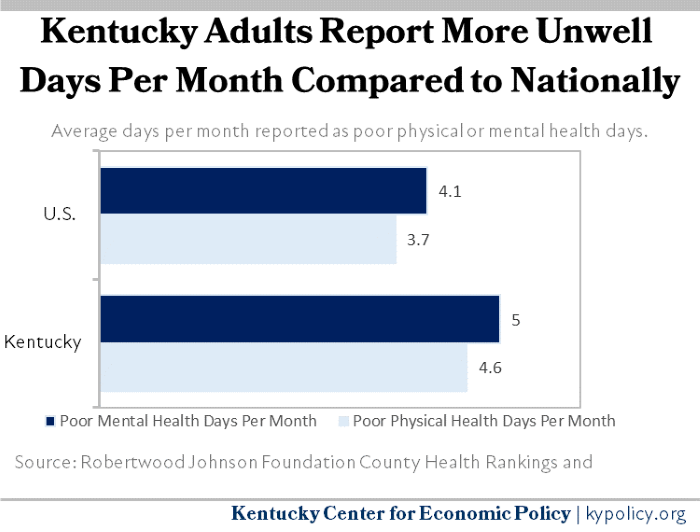When Kentucky’s legislature gathers each year, the decisions they make either improve health in Kentucky or worsen it — and not just through legislation related specifically to health care. Kentuckians’ ability to be well is dependent on many factors like food, water, housing, economic security, education and experience with the criminal legal system. These social determinants of health — or the conditions in which people live, work and play — determine quality of life and opportunities to be healthy.
The legislature’s impact on these health factors is only amplified by the pandemic and economic fallout — a situation calling for a strong policy response to unprecedented levels of job loss and hardship. While the 2021 Kentucky General Assembly took moderate steps that improved health care and provided some resources to people leaving incarceration, it also made policy decisions that missed opportunities to improve conditions for health in the commonwealth — and in some cases worsened them.
Kentucky is already struggling when it comes to health outcomes
The newest annual report from Robert Wood Johnson Foundation’s County Health Rankings provides data about the relatively large share of Kentuckians in poor health. According to the newly released data, 22% of Kentucky adults report fair or poor health (the lowest-possible self-reported health status), compared to 17% nationally.

Kentuckians also reported feeling physically unwell an average of 4.6 days per month and mentally unhealthy an average of 5 days per month, compared to 3.7 physically unhealthy days and 4.1 mentally unhealthy days a month nationally.

This data was collected before the COVID-19 pandemic, and our health outcomes have undoubtedly worsened. Early analysis on impacts of the pandemic suggests we have had an increased burden on our hospital system, a decrease in accessing preventive services and worsening health outcomes like increased overdose deaths, poor mental health outcomes and increases in chronic disease.
While making sure that Kentuckians are insured and can access health care is vital during the pandemic, we must also address additional factors, like incarceration, education and economic security to improve Kentuckians’ health and how well we weather emergencies like the pandemic.
More policy changes needed to mitigate the negative health outcomes associated with incarceration
Even outside the pandemic and its health risks for people living in congregate settings, it was widely understood that incarceration worsens the health of people incarcerated and the families and communities they return to. Kentucky’s high rates of parental incarceration, for instance, harm children’s education, economic and social opportunities — which has lifelong consequences for health. And COVID-19 has spread dramatically in Kentucky’s prisons and still too-crowded jails, harming individuals, families and communities.
Despite these consequences, Kentucky incarcerates too many people. After an initial decrease in incarceration due to the pandemic, Kentucky’s jail population has been ticking steadily back up. And while the 2021 General Assembly took several steps that will help reduce incarceration, much more work is needed to build on successes like House Bill (HB) 126, which will increase the felony theft threshold, and Senate Bill (SB) 32, which will end mandatory transfers of youth over 14 to adult court — a policy that disproportionately transferred Black teens. Additional sentencing and pretrial policy changes like SB 223, a bill introduced this session that would have incrementally reduced pretrial incarceration, could help reduce the incarcerated population over time.
But reducing incarceration is not enough; we must also change policy so that Kentuckians leaving incarceration have opportunities to thrive and be healthy. Barriers established in state and federal policy have locked justice–involved Kentuckians out of opportunities to meet basic needs. The resulting food insecurity, lack of health insurance and access to mental health care, for instance, are risk factors for being incarcerated again, and lead to long-term negative impacts on health.
Kentucky made progress this session by passing HB 497, a reentry package which provides people leaving incarceration with IDs and Medicaid 30 days before release, and removes the longstanding ban on SNAP food assistance for anyone with a prior drug-related felony conviction. Thousands of Kentuckians have lost food assistance every year because of this ban. HB 53 will also contribute to healthy reentry by creating a Medicaid Technical Assistance Committee for people who have been incarcerated, where they can provide real-world feedback to state administrators on which programs and interventions work and which do not.
Improved early learning and care will improve health, but the state must recommit to adequate funding
Early childhood education and care is fundamental to children’s development and health. High quality child care, which has been disrupted in the pandemic, provides a support to parents as well, which impacts the health of the whole family.
This session, Kentucky’s General Assembly passed two significant improvements to early education and care. HB 405 provides a boost to high-quality child care by increasing the reimbursement rate by $2 per child in the Child Care Assistance Program (CCAP) to help adequately cover the associated costs. The state can build on this important step by raising the income limit for eligibility from 160% to 200% of the federal poverty level and permanently eliminating co-pays families pay to participate. These changes will allow more low- and moderate-income families to ensure high-quality care for their children.
Another win, HB 382, provided $140 million in one-time funding for full-day kindergarten. Full-day kindergarten has been shown to improve lifelong academic and health outcomes. Since HB 382 only covers the costs of full-day Kindergarten for one year, next session the legislature must change the Support Education Excellence in Kentucky (SEEK) formula to make full-day kindergarten permanent and ensure the associated amount of resources are included in the budget.
Despite these wins, the General Assembly failed to make needed investments. The austere 2022 budget does not include any money for resources like text books or teacher raises. Though significant federal relief in the American Rescue Plan will help mitigate some of the harms of the pandemic through $2 billion to Kentucky public schools and universities to address learning loss, support students and safe operations moving forward, this funding is temporary and for specific needs. The state must recommit to adequate funding for education in order to create the conditions for well-being in the commonwealth.
General Assembly chose corporate tax breaks over individual relief, harming health
People’s ability to make ends meet shapes their ability to be healthy. When there isn’t enough money to keep food on the table, make rent or pay down debt, it is harder to be healthy and easier for heath to deteriorate. For instance, lack of consistent access to food has long-term impacts on health and is linked to negative health outcomes including poor health status, chronic diseases, developmental and mental health, particularly for children.
The economic downturn and record job losses seen in the pandemic have left families struggling. According to the latest Census Household Pulse Survey data, as of March 2021, 32% of adults in Kentucky have difficulty covering usual household expenses.
The General Assembly had a unique opportunity this session to remove pandemic-related barriers to economic security by appropriating federal relief funds to people in the greatest need. Lawmakers were able to make some investments in health through infrastructure, including allocating $250 million to ensure Kentuckians have clean drinking water and wastewater infrastructure and $300 million to expand broadband. However, the legislature did not seize the opportunity to provide direct relief to Kentuckians and families, instead prioritizing tax breaks for corporations as a way to spend available resources. And they passed an austere budget that did not include investments in key needs such as hiring more social workers to address the child welfare crisis, providing operating support for local libraries and adequately reducing the waiting lists for community-based care for Kentuckians with disabilities. In fact, for some people, the legislature erected new barriers to assistance. SB 65 bans non-custodial parents and their families behind on child support from receiving needed food assistance. When this policy was previously in place from 2018 to 2020, over 14,000 Kentuckians and 6,000 kids lost needed grocery money.



